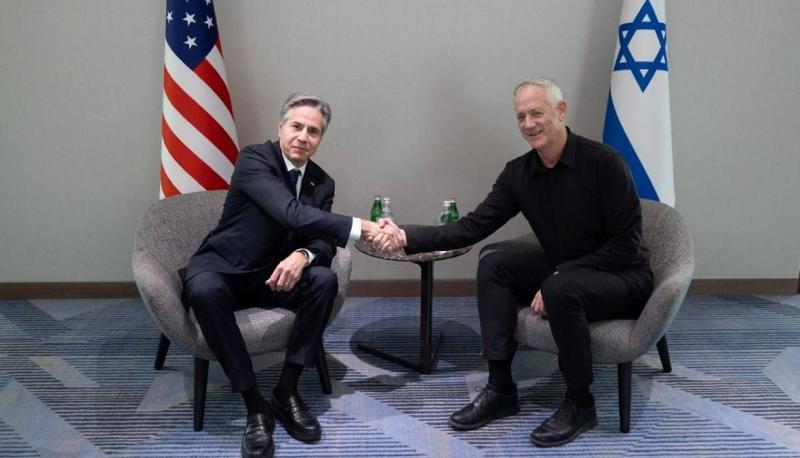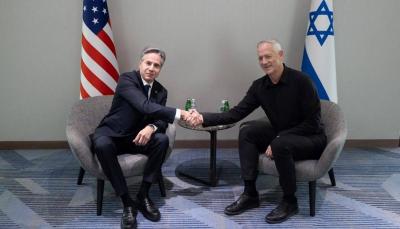In his eighth Middle Eastern tour since the October 7 attack and the outbreak of war in Gaza, U.S. Secretary of State Antony Blinken arrived in Israel and met with the resigned war cabinet minister Benny Gantz. This comes amid rising tensions between Gantz and Prime Minister Benjamin Netanyahu, who viewed Gantz’s departure from the government as a "withdrawal from the battle." Blinken met Netanyahu on Monday before holding meetings Tuesday with Gantz and opposition leader Yair Lapid, and meeting families of Israeli hostages held by Hamas, who welcomed him with banners calling for the implementation of the ceasefire proposal announced by U.S. President Joe Biden at the end of last month.
A right-wing Israeli analyst characterized Blinken's meeting with Gantz, following Gantz’s exit from the government and his lack of an official title, as "an unacceptable interference in internal affairs." Meanwhile, a leftist analyst noted that such meetings are normal, as Gantz is a prominent figure who is a strong challenger and a potential successor to Netanyahu in any upcoming elections.
During his visit to Tel Aviv, Blinken urged Hamas (classified as a terrorist organization by the U.S. and other countries) to accept the U.S. proposal for a ceasefire, emphasizing that Hamas’s recent statement supporting the UN Security Council's decision regarding the U.S. proposal "offers hope." However, he asserted that "what matters is what comes from Hamas leaders inside Gaza," likely referring to the group's leader in the region, Yahya Sinwar.
**Intervention or Important Consultations?**
Israeli opposition leader Yair Lapid published a picture of himself with Blinken on his X platform account, stating: "We need to reach an agreement. We will not rest until everyone (the hostages) returns, and this country will not sleep or rest until we reach an agreement." Gantz also wrote on X that he emphasized during his meeting with Blinken the "need to apply maximum pressure on the negotiators right now to ensure Hamas accepts the proposal that brings the hostages home," highlighting his support for "any responsible arrangement in this regard."
Israeli analyst Mordechai Kedar stated in remarks to Al-Hurra that Blinken’s meeting with Gantz "is an unacceptable interference by the U.S. administration in Israel's internal politics," asserting that they do not realize it provokes anger among many Israelis, especially supporters of the government. He added, "Israel is a democratic state, and this democracy produced a government, and even if it does not appeal to some Americans, that does not justify interference in Israel's internal affairs."
However, left-leaning analyst Yoav Stern clarified that when the U.S. Secretary of State visits Israel, he "wants to meet all the political players," adding that "it is not unusual for opposition leader Lapid to meet or even Gantz, who plays a significant role, as polls indicate he leads the largest party in the next Knesset." He continued, "Everyone understands that Gantz is currently outside the government, but his vision and consultations are very important for reaching a solution to the current situation, and the United States should continue such consultations."
**Crisis with Netanyahu**
When announcing his resignation from the war cabinet, National Unity Party leader Benny Gantz stated, "Unfortunately, Netanyahu prevents us from achieving a real victory, so we are leaving the unity government with heavy hearts." After promising on May 18 to resign, Gantz revealed on Sunday that he stepped down from the war government in "a move that could destabilize Prime Minister Netanyahu's weak grip on his coalition government." Gantz is seen as a more liberal counterbalance to Netanyahu, according to the Washington Post.




